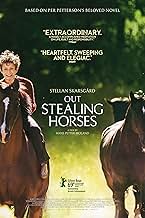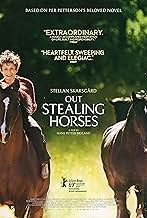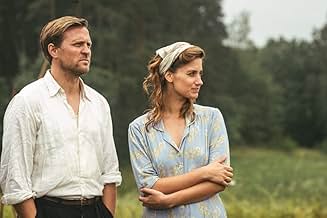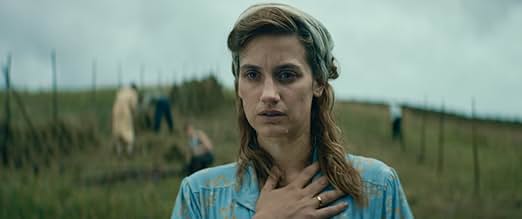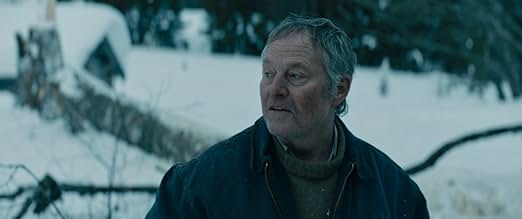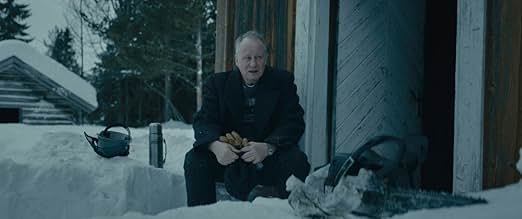CALIFICACIÓN DE IMDb
6.5/10
3.5 k
TU CALIFICACIÓN
Agrega una trama en tu idiomaA grieving widower moves to the country where a chance encounter rekindles memories from his past.A grieving widower moves to the country where a chance encounter rekindles memories from his past.A grieving widower moves to the country where a chance encounter rekindles memories from his past.
- Dirección
- Guionistas
- Elenco
- Premios
- 7 premios ganados y 11 nominaciones en total
Tone Beate Mostraum
- Tronds mor
- (as Beate Mostraum)
Anders Baasmo
- Olav
- (as Anders Baasmo Christiansen)
- Dirección
- Guionistas
- Todo el elenco y el equipo
- Producción, taquilla y más en IMDbPro
Opiniones destacadas
Greetings again from the darkness. Contrasts are plentiful in this film. The bleakness of winter versus the greenery of summer. The resignation of old age versus the naivety of youth. Pet Petterson's award-winning novel was released in Norway in 2003, and then in English version in 2005. Norwegian director Petter Moland tackles it with the best intentions, though the nuances prove too much for one movie. Mr. Moland is a fine director as evidenced by his excellent IN ORDER OF DISAPPEARANCE (2014) with Stellan Skarsgard and the English remake COLD PURSUIT (2019) with Liam Neeson.
Morland and Skarsgard reunite as the actor takes on the role of the elder Trond, who we first see as he has relocated to Norway from Sweden. Through his narration, we learn Trond has lived in Sweden for 42 years, and it's a chance meeting with his new neighbor Lars (Bjorn Floberg) that triggers memories of one summer when he was 15 years old. It's now 1999, and the impending new millennium has Trond self-isolating on top of the grief and loneliness he has carried since his wife was killed in a car crash. Skarsgard is an actor who can be either sympathetic or powerful, and he brings gravitas to a character who is mostly lost at this late stage in life.
Much of the film is spent in Trond's flashback to 1948, when he lived the summer with his father, a "practical" man, at his cabin in Norway. Young Trond is played very well by Jon Ranes in his first role. He clearly admires his father (Tobias Santelmann, KON-TIKI, 2012) and enjoys working beside him and taking rain showers alongside. Over the weeks, Trond and his father become entangled with a village family after a tragedy involving Lars (the future neighbor) when he was very young, and Lars' father and mother (Danica Curcic). What follows for Trond are the things in life that cause us to alter our view of people and the world. Lost innocence is rarely easy.
Cinematographer Rasmus Videbaek (A ROYAL AFFAIR, 2012) captures the beauty of nature during the 1948 summer, as well as the stark white stillness of 1999 winter. Some of the look and feel and symbolism reminds of the work of Terrence Malick. The stunning Norwegian landscapes play a role for us as viewers and for Trond. There are also some quiet moments that carry weight between the elder Lars and Trond, as the missing pieces of life slowly fall into place.
The elder Trond states his goal is "to sleep as heavily as possible without being dead", but we see part of him may have already died. Flashbacks to that summer, and even earlier during the war, combine with some awkward conversations with Lars to fill in gaps that had blurred over the years. Childhood memories from old age are often not to be trusted, but coming to grips with one's family and the past may bring peace - or it may not. Trond is an avid reader of Dickens' "David Copperfield" and there are many references throughout. He's even given life advice: "Don't be bitter", which is a worthy goal for all. It's an odd film with multiple timelines and damaged characters at different stages. It may not reach the level of Petterson's novel, but director Moland gives us plenty to mull.
Morland and Skarsgard reunite as the actor takes on the role of the elder Trond, who we first see as he has relocated to Norway from Sweden. Through his narration, we learn Trond has lived in Sweden for 42 years, and it's a chance meeting with his new neighbor Lars (Bjorn Floberg) that triggers memories of one summer when he was 15 years old. It's now 1999, and the impending new millennium has Trond self-isolating on top of the grief and loneliness he has carried since his wife was killed in a car crash. Skarsgard is an actor who can be either sympathetic or powerful, and he brings gravitas to a character who is mostly lost at this late stage in life.
Much of the film is spent in Trond's flashback to 1948, when he lived the summer with his father, a "practical" man, at his cabin in Norway. Young Trond is played very well by Jon Ranes in his first role. He clearly admires his father (Tobias Santelmann, KON-TIKI, 2012) and enjoys working beside him and taking rain showers alongside. Over the weeks, Trond and his father become entangled with a village family after a tragedy involving Lars (the future neighbor) when he was very young, and Lars' father and mother (Danica Curcic). What follows for Trond are the things in life that cause us to alter our view of people and the world. Lost innocence is rarely easy.
Cinematographer Rasmus Videbaek (A ROYAL AFFAIR, 2012) captures the beauty of nature during the 1948 summer, as well as the stark white stillness of 1999 winter. Some of the look and feel and symbolism reminds of the work of Terrence Malick. The stunning Norwegian landscapes play a role for us as viewers and for Trond. There are also some quiet moments that carry weight between the elder Lars and Trond, as the missing pieces of life slowly fall into place.
The elder Trond states his goal is "to sleep as heavily as possible without being dead", but we see part of him may have already died. Flashbacks to that summer, and even earlier during the war, combine with some awkward conversations with Lars to fill in gaps that had blurred over the years. Childhood memories from old age are often not to be trusted, but coming to grips with one's family and the past may bring peace - or it may not. Trond is an avid reader of Dickens' "David Copperfield" and there are many references throughout. He's even given life advice: "Don't be bitter", which is a worthy goal for all. It's an odd film with multiple timelines and damaged characters at different stages. It may not reach the level of Petterson's novel, but director Moland gives us plenty to mull.
Every apparently unspectacular event, from the felling of a tree to the galloping of a restless horse, takes on a narrative value, a truly beautiful film
Watching movies at a festival has disadvantages. The second movie (or the next ones!) seen on the same day may catch you as a more tired spectator, or under the impression of the previous movie, or confused by the alternation of styles and genres. This is, perhaps, what happened to me watching the Norwegian director Hans Petter Moland's film 'Ut og stjæle hester' (or 'Out Stealing Horses'), a psychological drama with references to the relatively recent history, interestingly constructed, and benefiting from the participation of an excellent team of actors. And yet, although I really liked one of Moland's previous films ('In Order of Disappearance'), I was a little stuck watching this movie. The fault may be mine, but not only mine.
The story takes place in 1999, on the threshold of the millennium, that period exactly 20 years ago, when the entire planet was preparing for parties and was obsessed with the millennium bug. The main hero (the excellent Stellan Skarsgård) seems to be trying to run away from the world after he his wife had died in a traffic accident, buying a house in a village far from the turmoil of the world. It is precisely here that the past reaches him through the accidental encounter of a forgotten friend from adolescence. The film reconstructs through interleaved flashbacks the decisive summer of his coming to age, in the years immediately following the war that had left traces in people's souls and in the relationships between them. We progress in the remembrance of the past together with the old man. But how much of memory can be trusted after a lifetime has passed? Was the reality then known, understood, and especially as does it matter today?
The questions are interesting, but one of the problems of the film is that the scriptwriter (also Moland adapting a novel) and the director try to give them a little too explicit answer, along the lines of Buddhist philosophy. Another problem is the lack of dynamism in the evolution of the characters. The film is beautifully filmed and played brilliantly (by Skarsgård, but also by the young actor who plays him as a teenager, and by the whole team), and yet 'Out Stealing Horses' failed to captivate me, introduce me to the story, involve me. The distance between me and Scandinavia, its history, its people and problems, has not been completely eliminated in this film.
The story takes place in 1999, on the threshold of the millennium, that period exactly 20 years ago, when the entire planet was preparing for parties and was obsessed with the millennium bug. The main hero (the excellent Stellan Skarsgård) seems to be trying to run away from the world after he his wife had died in a traffic accident, buying a house in a village far from the turmoil of the world. It is precisely here that the past reaches him through the accidental encounter of a forgotten friend from adolescence. The film reconstructs through interleaved flashbacks the decisive summer of his coming to age, in the years immediately following the war that had left traces in people's souls and in the relationships between them. We progress in the remembrance of the past together with the old man. But how much of memory can be trusted after a lifetime has passed? Was the reality then known, understood, and especially as does it matter today?
The questions are interesting, but one of the problems of the film is that the scriptwriter (also Moland adapting a novel) and the director try to give them a little too explicit answer, along the lines of Buddhist philosophy. Another problem is the lack of dynamism in the evolution of the characters. The film is beautifully filmed and played brilliantly (by Skarsgård, but also by the young actor who plays him as a teenager, and by the whole team), and yet 'Out Stealing Horses' failed to captivate me, introduce me to the story, involve me. The distance between me and Scandinavia, its history, its people and problems, has not been completely eliminated in this film.
Saw this at the Berlinale 2019, where it was part of the official Competition for the golden bear. While not winning the 1st Prize, the jury awarded a Silver Bear for Outstanding Artistic Contribution, for Rasmus Videbæk who was responsible for the cinematography. Be that as it may, however, the movie failed to interest me in the protagonists and their behavior. Shots of landscapes, rivers, nature and (of course, given the title) the horses were more interesting than what the actors said and did. So, it could have been a nice watch but that is never my prime reason to see a movie.
In particular, the frequent switching between 1999 and 1948 annoyed me several times. It broke the logic flow in the story line. Luckily, it was clear with every flash back/forward in which time frame we were, due to other actors playing the younger variants. For me it remained unclear from start to finish what it was that the protagonists did tick, and why they did what they did. I cannot imagine that the fatal Cain/Abel scene, where a young boy inadvertently shot his brother, can have such a long term bearing on everyone actions, but what do I know??
Maybe the underlying book is better in explaining the psychology driving these people's actions, but I missed it dearly here. It is even very well possible that the Cain/Abel scene was not so important after all, but that it was the woman he had eyes on but who was in fact courted by his father. I wonder, due to suggestions in that direction in the announcement on the Berlinale website, but I can recall only a single scene from memory to more or less confirm this plot element.
All in all, despite the visual elements to make it a nice watch, I failed to get interested in the story or the psychology of the protagonists. I see hints in various reviews that there is more substance than I could derive from it. Such things can happen during a festival where one sees three of four movies per day.
In particular, the frequent switching between 1999 and 1948 annoyed me several times. It broke the logic flow in the story line. Luckily, it was clear with every flash back/forward in which time frame we were, due to other actors playing the younger variants. For me it remained unclear from start to finish what it was that the protagonists did tick, and why they did what they did. I cannot imagine that the fatal Cain/Abel scene, where a young boy inadvertently shot his brother, can have such a long term bearing on everyone actions, but what do I know??
Maybe the underlying book is better in explaining the psychology driving these people's actions, but I missed it dearly here. It is even very well possible that the Cain/Abel scene was not so important after all, but that it was the woman he had eyes on but who was in fact courted by his father. I wonder, due to suggestions in that direction in the announcement on the Berlinale website, but I can recall only a single scene from memory to more or less confirm this plot element.
All in all, despite the visual elements to make it a nice watch, I failed to get interested in the story or the psychology of the protagonists. I see hints in various reviews that there is more substance than I could derive from it. Such things can happen during a festival where one sees three of four movies per day.
10lpuraite
My sincere Thanks for this magic and deep movie to the film director, the actors, all entire team and producing company.
I'm very grateful and happy that I got to see this movie live in the cinema in my own language. I am grateful to the film director and the all entire team.
I'm not sure if this movie is for everyone. Perhaps only a mature, artistic or life experienced person can sense and understand it. I was involved and lulled like listening to poem, orchestra or lullaby from the very first to the last second, the scene, the view, the sound .. I wanted it to last longer ... And the movie still leaves in me.. Left threads..
Each tiny sound, angle, moment, view, actors, acting.. resonated within me. It felt like Director is playing the strings in me, touches, hits each hidden moment, emotion, living in me. Amazing camera, sound and others job. Amazing actors, amazing acting, high level art . Each made me feel wanna cry from amazing "job" done.
And I didn't care actually about the story line too much this time. My opinion, it's not the point about this movie. I went out uplifted, deeply touched and the movie stayed within me... with me. Like a very very close and intimate friend.
Thank you from Lithuania.
¿Sabías que…?
- TriviaTobias Santelmann, Pål Sverre Hagen and Anders Baasmo previously worked together on Un viaje fantástico (2012), as Knut Haugland, Thor Heyerdahl, and Herman Watzinger respectively.
- Bandas sonorasVindhester
Composed by Kåre Vestrheim
Selecciones populares
Inicia sesión para calificar y agrega a la lista de videos para obtener recomendaciones personalizadas
- How long is Out Stealing Horses?Con tecnología de Alexa
Detalles
- Fecha de lanzamiento
- Países de origen
- Sitio oficial
- Idiomas
- También se conoce como
- Out Stealing Horses
- Locaciones de filmación
- Productoras
- Ver más créditos de la compañía en IMDbPro
Taquilla
- Presupuesto
- EUR 4,100,000 (estimado)
- Total a nivel mundial
- USD 1,480,790
- Tiempo de ejecución2 horas 3 minutos
- Color
- Relación de aspecto
- 2.35 : 1
Contribuir a esta página
Sugiere una edición o agrega el contenido que falta



